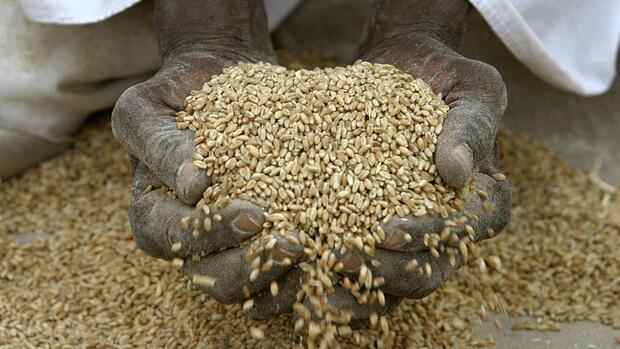Dependence on wheat is high worldwide.
(Photo: dpa)
Berlin When Martin Frick, head of the UN World Food Program (WFP) in Germany, talks about the future of food security, he points to his wall. The poster in his office in Berlin-Mitte shows women drawing crescent circles in the dry earth in a desert-like landscape.
In the middle of each crescent is a tree. The photo is taken in Niger, Central Africa. The crescent-shaped holes are supposed to dam up the little rain there and thus better supply the plants with water.
For Frick, the picture illustrates how the world could put its food system back in order. Back to the local cultivation of traditional foods such as lentils, quinoa or cassava, away from the almost insatiable need for the same food over and over again. Frick says: “It has become fashionable all over the world to eat western food.” More than 40 percent of the calories consumed internationally are now based on wheat, rice and corn.
Now that Russia has invaded Ukraine, the “granary of the world,” and is blocking wheat exports, starvation is looming. The United Nations (UN) estimate that around 44 billion euros will be needed in 2022 to provide for all those in need.
Top jobs of the day
Find the best jobs now and
be notified by email.
In June, the WFP announced that it would have to cut food rations for refugees in several West African countries. WFP Executive Director David Beasley spoke of a “heartbreaking decision”.
trough instead of plate
For WFP Germany boss Frick, the food supply on other continents is also related to consumption here in Germany. After all, the world’s needy people are also in competition with European livestock in the distribution competition for wheat.
According to the Federal Ministry of Economics and Technology in Germany, 58 percent of the total consumption of wheat ends up in the trough of animals.
(Photo: dpa)
Because according to the Federal Ministry of Agriculture, around 58 percent of the total wheat consumption in Germany ends up in the trough of the animals. For Frick, an argument against factory farming: “Keeping cattle on the pasture is much more species-appropriate and productive,” he says. Because grass grows there anyway.
Frick sees another factor for better food distribution in the supermarket shelves. According to the Federal Ministry of Agriculture, around 10.9 million tons of food ended up in the garbage can instead of in the stomach in 2020. “If there are still 40 packages of sushi to be bought in the supermarket on a Saturday evening, it’s clear that not all of them will be eaten,” Frick criticizes the consumer habits.
And the Germans would have to get used to something else in the long term: higher prices. “We had incredibly cheap groceries for years,” criticizes Frick. That will now change in the long term.
Martin Frick is Germany head of the UN World Food Program (WFP).
(Photo: UN World Food Program)
In 2020, Germans invested only twelve percent of their spending in food and beverages, significantly less than the EU average of almost 15 percent. According to Welthungerhilfe, however, in many countries in the Global South this proportion is between 50 and 100 percent. Rising food prices there can hardly be compensated for by making sacrifices elsewhere – there is a risk of hunger.
Malnutrition in Germany
Although this danger does not exist in Germany, Martin Frick sees that many people in this country are also malnourished. It’s not about the question of enough calories, but people are also malnourished for whom high-quality food is too expensive.
“Being overweight can also be a form of malnutrition, for example if the body does not get enough minerals and vitamins and demands more and more food,” explains Frick. In addition, many people no longer know how to prepare fresh food themselves. “I’m a big fan of teaching kids to cook from an early age,” he says.
He sees both challenges and great opportunities for the coming development of world nutrition. On the one hand, the Ukraine war will also affect the coming harvests – not only locally, but everywhere. Because Russia has established itself on the world market as a major supplier of three products: energy, wheat and artificial fertilizers. A change in the supply of all three goods can therefore shake the global food system.
Millions of tons of grain have been blocked by Russia in Ukraine for weeks.
(Photo: dpa)
But Frick also sees this as an opportunity to reform the broken global system in the long term. A system that is not only under massive pressure from the Ukraine war, but also from the corona pandemic and above all the climate crisis.
Frick’s vision for feeding the world is greater diversity in cultivation and a stronger focus on foods that make sense for the respective region. However, without falling into protectionism. He hopes that not only the women in Niger, but also the people in Germany will benefit from this in the long term.
More: World War with guns and wheat
